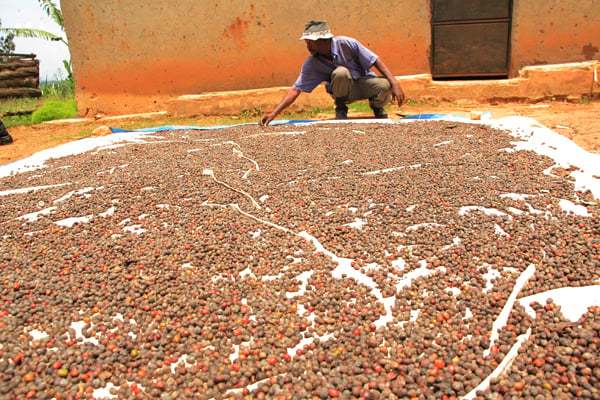Feeling the pinch of climate change

Young people in both on-farm and off-farm activities in the agricultural sector have seen their productivity and incomes decrease due to climate variability and predictable weather patterns. Photo / Racheal Mabala
What you need to know:
- From shifting weather patterns that threaten food production to rising sea levels that increase the risk of catastrophic flooding, the impacts of climate change are global in scope and unprecedented in scale.
On October 29, 2021, the World Bank analysis found that climate change may push over 130 million into poverty by 2030 and cause over 200 million people to migrate within their own countries by 2050.
From shifting weather patterns that threaten food production to rising sea levels that increase the risk of catastrophic flooding, the impacts of climate change are global in scope and unprecedented in scale.
Climatic activists and academicians in the University of Cambridge and Makerere University have warned that climate disruptions are having devastating impacts on human lives and livelihoods, and need urgent concrete measures to safeguard the future of the young people in Uganda be economically productive.
A report titled: Living in the Climate Crisis: Young people in Uganda based on research done jointly between the University of Cambridge and Makerere University states that climate crisis is amplifying the development and economic challenges that have faced young people in Sub-Saharan Africa for decades.
The researcher said the report documents the divers’ livelihood strategies of young people living in Uganda, the impacts of climate change on their lives, and the adaptation and migration strategies that they have employed to address the crisis so far.
The research draws on 1,214 survey responses, 102 interviews, and 12 focus group discussions with young people in Karamoja and Busoga sub-regions of Uganda. The report also highlights insights from the multisector, youth-centered Kampala.
Presenting the key findings on the climate impacts on youth livelihoods in Uganda by Dr Anna Barford of the University of Cambridge, the senior associate said: “Our study found that 76 percent of survey respondents had their livelihood disrupted by environmental changes during the past year. 53 percent of them also indicated pausing their livelihood activities for at least seven days due to climate change.”
Dr Anna said young people engaged in both on-farm and off-farm activities in the agricultural sector have seen their productivity and incomes decrease due to climate variability and predictable weather patterns.
“This has produced ripple effects on other aspects of their lives including health, food and nutrition, and education,” she said.
Livelihoods changing
The report indicates that 45 percent of young people surveyed had changed their livelihood activities because they were no longer viable /profitable after being affected by environmental changes. For instance, from agriculture to informal small-scale businesses including boda bodas, carpentry, small-scale mining, poultry.
ALSO READ: Address climate change induced migration
The report shows that more young women constitute 32 percent than young men which had 26 percent dependent on daily income. This hand-to-mouth approach makes them particularly exposed to climate shocks. In contrast, young men are concentrated on informal part-time and full-time roles.
After switching to alternative livelihoods, young people reported feeling the impacts of climate change. This was reflected in higher costs of living, higher costs of inputs and raw materials, and less profitable markets.
The young people are becoming increasingly vulnerable after experiencing climate-driven loss or crop yields, livestock, and damage to raw materials and important infrastructures such as homes, roads, and crop storage.
Displacement
It also found out that 92 survey respondents expect these environmental changes to cause further migration, displacement, food insecurity and conflict in the future.
Dr David Mfitumukiza, a senior lecturer in the Department of Geography, Geo-Informatics and Climatic Sciences at Makerere University said climate change is already impacting Uganda through both rapid-and slow –onset. In recent years, notable impacts include falling lake and river levels, more frequent and severe droughts, and erratic and excessive rainfall leading to flooding, mudslides, and excessive rainfall.
Exposure to climate risks has been exacerbated by influxes of refugees from neghbouring Democratic Republic of Congo, South Sudan and Somalia with estimated one and half million refugees now in Uganda.
He said climate change and development are linked in diverse ways with the first one being the disruption and increasing uncertainty associated with environmental changes will impact on social and economic development.
“Secondly, developed countries are responsible for far greater per capita emissions than less developed countries, presently and historically. The Uganda national pathway to development currently relies on oil, gas and mineral extraction; yet on this path Uganda will continue to contribute to the global climate crisis,” he said.
On the key facts on the impact of climatic change in health, on October 30, 2021, the World Health Organisation (WHO) said vlimate change affects the social and environmental determinants of health – clean air, safe drinking water, sufficient food and secure shelter.
The WHO said between 2030 and 2050, climate change is expected to cause approximately 250,000 additional deaths per year, from malnutrition, malaria, diarrhea and heat stress.
“The direct damage costs to health (i.e. excluding costs in health-determining sectors such as agriculture and water and sanitation), is estimated to be between $2-4 billion/year by 2030. Areas with weak health infrastructure – mostly in developing countries – will be the least able to cope without assistance to prepare and respond,” said WHO.
The WHO said reducing emissions of greenhouse gases through better transport, food and energy-use choices can result in improved health, particularly through reduced air pollution.
DON'T MISS: Climate change: No more excuses but actions
The UN Climate Change Conference in Glasgow (COP26) brought together 120 world leaders and over 40,000 registered participants, including 22,274 party delegates, 14.124 observers and 3.886 media representatives.
For two weeks, the world was riveted on all facets of climate change — the science, the solutions, the political will to act, and clear indications of action.




